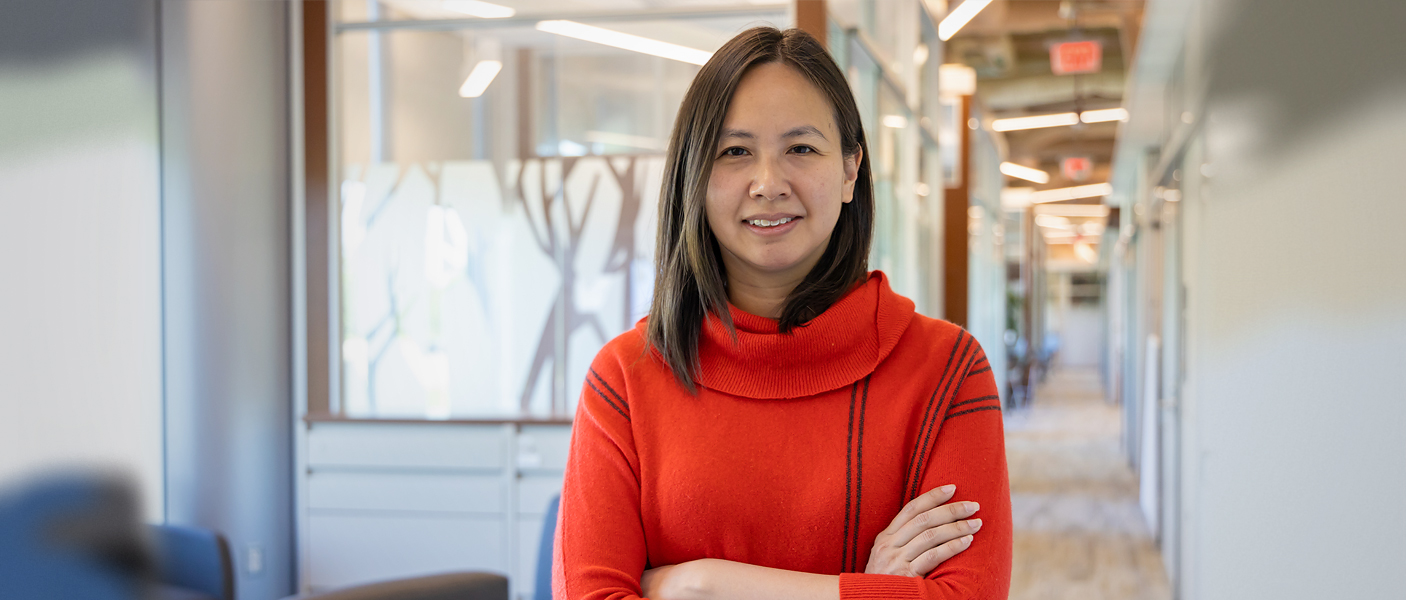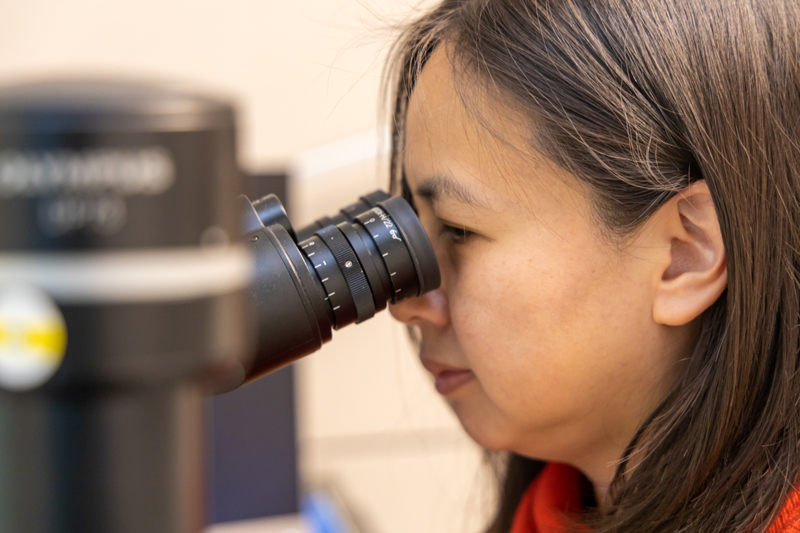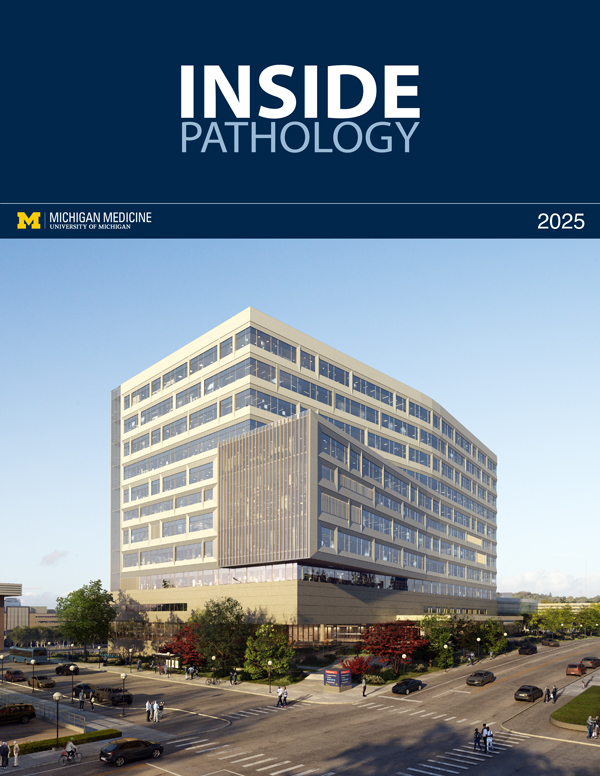

Diversity, Equity, and Inclusion (DEI) at Michigan Medicine are among the highest-priority core values for the health system. In collaboration with the Office of Health, Equity, and Inclusion (OHEI), DEI refers to the idea of using employees’ identities in order to understand, navigate, and accept all members within the workplace, no matter their differences. But what exactly does this mean in the context of Pathology?
 Dr. Angela Wu, Associate Professor and Assistant Chair for Diversity, Equity, and Inclusion in the Department of Pathology, describes DEI in three main parts. “Diversity has to do with identity. It is how you best define yourself, which can be so complex and different for each individual.” It can be related to one’s cultural background, how or where they grew up, their societal roles, political beliefs, what their families are like, and much more. “Ultimately, it is how you see yourself,” Wu says. Diversity is also essential because it allows for more large-scale success in the organization. “Having different opinions and backgrounds is one of the most fundamental keys to success,” Wu explains. “It challenges us in ways that cause us to develop new and innovative ideas.”
Dr. Angela Wu, Associate Professor and Assistant Chair for Diversity, Equity, and Inclusion in the Department of Pathology, describes DEI in three main parts. “Diversity has to do with identity. It is how you best define yourself, which can be so complex and different for each individual.” It can be related to one’s cultural background, how or where they grew up, their societal roles, political beliefs, what their families are like, and much more. “Ultimately, it is how you see yourself,” Wu says. Diversity is also essential because it allows for more large-scale success in the organization. “Having different opinions and backgrounds is one of the most fundamental keys to success,” Wu explains. “It challenges us in ways that cause us to develop new and innovative ideas.”
Equity is the fair treatment of everyone, regardless of their race, religion, gender, creed, sexual orientation, or personal beliefs. Feeling like an employee’s individual contributions are making a difference is also a key piece of the puzzle. “Everyone deserves the same opportunities to succeed, and they deserve to be valued,” Wu describes. This goes hand-in-hand with inclusion, too. Despite the challenges that may arise, she remarks that workforces can be educated on how to improve as a community through a variety of training. “We all have unintentional biases and prejudices but being able to mitigate these things is the best way to promote equality.”
"Everyone deserves the same opportunities to succeed, and they deserve to be valued."
After initially completing Medical School at Northwestern University in Chicago, Wu attended the University of Michigan for her residency program in anatomic and clinical pathology, followed by fellowships in surgical and genitourinary pathology. “I knew it was a very highly-rated residency program,” she says. “The reputation is unrivaled in terms of clinical care and research; it has truly become a second family.” However, while progressing through her own residency program several years back, Wu admits that diversity was never something that was acknowledged as heavily as it should have been, so it has motivated her to spearhead these efforts in her current role at Michigan Medicine. Because of her continued interest in DEI over the years, Wu was selected for the newly-created position of Assistant Chair for DEI, in addition to maintaining her status as a faculty member within the Department of Pathology.
The Department has a variety of ongoing goals for creating a larger sense of belonging within the workplace. This includes participating in Michigan Medicine’s Diversity in Medicine Conference, inaugural Youth Summit, hosting the annual Equality Walk for Juneteenth, and working closely with the Office of Health, Equity, and Inclusion (OHEI) to strengthen the core values of the organization. Equally important, Wu notes, is involving trainees in DEI efforts. This has been accomplished through the creation of a resident-exclusive DEI committee, through which the residents sent out a survey focused on addressing some of the biases that may be present within the workplace. They also created more standardized recruitment tools, which have allowed them to target and appeal to larger groups of potential trainees across the country.
“Perhaps the most significant milestone is the development of the Pathology Anti-Racism Taskforce,” Wu says. “This opens the door for new initiatives like Lunch and Learn educational film sessions, a book and movie club where folks can learn more about anti-racism as it is portrayed in media, expansion of the Equality Walk, and potentially even a new diversity-focused podcast,” she describes. While it can sometimes be challenging to generate interest in DEI-related projects, the events are a great way to attract more people, including faculty, staff, and leadership. “Dr. David Gordon has been instrumental in the process,” Wu explains. Gordon, who was named the Director of Faculty Programs with OHEI early in 2022, has a wealth of experience and knowledge as it relates to diversity, equity, and inclusion within the health system. Likewise, Dr. Allecia Wilson, Director of Autopsy and Forensics, has done a great deal for DEI. In fact, Dr. Wilson has spoken to high school students and at local events to inspire folks to learn more about Pathology. Furthermore, Wu adds that support from the Office of the Chair, including Chair Dr. Charles Parkos and Vice Chairs Drs. Kathleen Cho and Jeffrey Myers have been key to setting these ideas into motion. “Despite being very busy, they continue to devote their time and effort to support this cause, which is what makes it so meaningful.”
Looking ahead to the future, Wu remarks that DEI efforts never truly end. Because the Department of Pathology is so team-oriented, it is uniquely equipped to branch out in so many different aspects. “You are always striving and working towards improvement,” she mentions. “To see that we are inspiring people, even the residents, is remarkable. I think that we have come a long way, but constantly wanting to do better is what DEI is all about,” she concludes.
 ON THE COVER
ON THE COVER
Breast team reviewing a patient's slide. (From left to right) Ghassan Allo, Fellow; Laura Walters, Clinical Lecturer; Celina Kleer, Professor. See Article 2014Department Chair |

newsletter
INSIDE PATHOLOGYAbout Our NewsletterInside Pathology is an newsletter published by the Chairman's Office to bring news and updates from inside the department's research and to become familiar with those leading it. It is our hope that those who read it will enjoy hearing about those new and familiar, and perhaps help in furthering our research. CONTENTS
|
 ON THE COVER
ON THE COVER
Autopsy Technician draws blood while working in the Wayne County morgue. See Article 2016Department Chair |

newsletter
INSIDE PATHOLOGYAbout Our NewsletterInside Pathology is an newsletter published by the Chairman's Office to bring news and updates from inside the department's research and to become familiar with those leading it. It is our hope that those who read it will enjoy hearing about those new and familiar, and perhaps help in furthering our research. CONTENTS
|
 ON THE COVER
ON THE COVER
Dr. Sriram Venneti, MD, PhD and Postdoctoral Fellow, Chan Chung, PhD investigate pediatric brain cancer. See Article 2017Department Chair |

newsletter
INSIDE PATHOLOGYAbout Our NewsletterInside Pathology is an newsletter published by the Chairman's Office to bring news and updates from inside the department's research and to become familiar with those leading it. It is our hope that those who read it will enjoy hearing about those new and familiar, and perhaps help in furthering our research. CONTENTS
|
 ON THE COVER
ON THE COVER
Director of the Neuropathology Fellowship, Dr. Sandra Camelo-Piragua serves on the Patient and Family Advisory Council. 2018Department Chair |

newsletter
INSIDE PATHOLOGYAbout Our NewsletterInside Pathology is an newsletter published by the Chairman's Office to bring news and updates from inside the department's research and to become familiar with those leading it. It is our hope that those who read it will enjoy hearing about those new and familiar, and perhaps help in furthering our research. CONTENTS
|
 ON THE COVER
ON THE COVER
Residents Ashley Bradt (left) and William Perry work at a multi-headed scope in our new facility. 2019Department Chair |

newsletter
INSIDE PATHOLOGYAbout Our NewsletterInside Pathology is an newsletter published by the Chairman's Office to bring news and updates from inside the department's research and to become familiar with those leading it. It is our hope that those who read it will enjoy hearing about those new and familiar, and perhaps help in furthering our research. CONTENTS
|
 ON THE COVER
ON THE COVER
Dr. Kristine Konopka (right) instructing residents while using a multi-headed microscope. 2020Department Chair |

newsletter
INSIDE PATHOLOGYAbout Our NewsletterInside Pathology is an newsletter published by the Chairman's Office to bring news and updates from inside the department's research and to become familiar with those leading it. It is our hope that those who read it will enjoy hearing about those new and familiar, and perhaps help in furthering our research. CONTENTS
|
 ON THE COVER
ON THE COVER
Patient specimens poised for COVID-19 PCR testing. 2021Department Chair |

newsletter
INSIDE PATHOLOGYAbout Our NewsletterInside Pathology is an newsletter published by the Chairman's Office to bring news and updates from inside the department's research and to become familiar with those leading it. It is our hope that those who read it will enjoy hearing about those new and familiar, and perhaps help in furthering our research. CONTENTS
|
 ON THE COVER
ON THE COVER
Dr. Pantanowitz demonstrates using machine learning in analyzing slides. 2022Department Chair |

newsletter
INSIDE PATHOLOGYAbout Our NewsletterInside Pathology is an newsletter published by the Chairman's Office to bring news and updates from inside the department's research and to become familiar with those leading it. It is our hope that those who read it will enjoy hearing about those new and familiar, and perhaps help in furthering our research. CONTENTS
|
 ON THE COVER
ON THE COVER
(Left to Right) Drs. Angela Wu, Laura Lamps, and Maria Westerhoff. 2023Department Chair |

newsletter
INSIDE PATHOLOGYAbout Our NewsletterInside Pathology is an newsletter published by the Chairman's Office to bring news and updates from inside the department's research and to become familiar with those leading it. It is our hope that those who read it will enjoy hearing about those new and familiar, and perhaps help in furthering our research. CONTENTS
|
 ON THE COVER
ON THE COVER
Illustration representing the various machines and processing used within our labs. 2024Department Chair |

newsletter
INSIDE PATHOLOGYAbout Our NewsletterInside Pathology is an newsletter published by the Chairman's Office to bring news and updates from inside the department's research and to become familiar with those leading it. It is our hope that those who read it will enjoy hearing about those new and familiar, and perhaps help in furthering our research. CONTENTS
|
 ON THE COVER
ON THE COVER
Rendering of the D. Dan and Betty Khn Health Care Pavilion. Credit: HOK 2025Department Chair |

newsletter
INSIDE PATHOLOGYAbout Our NewsletterInside Pathology is an newsletter published by the Chairman's Office to bring news and updates from inside the department's research and to become familiar with those leading it. It is our hope that those who read it will enjoy hearing about those new and familiar, and perhaps help in furthering our research. CONTENTS
|

MLabs, established in 1985, functions as a portal to provide pathologists, hospitals. and other reference laboratories access to the faculty, staff and laboratories of the University of Michigan Health System’s Department of Pathology. MLabs is a recognized leader for advanced molecular diagnostic testing, helpful consultants and exceptional customer service.